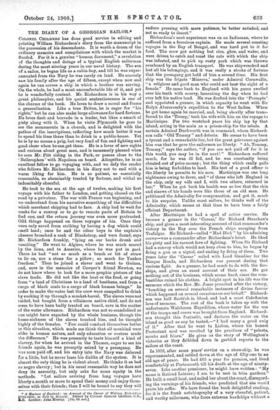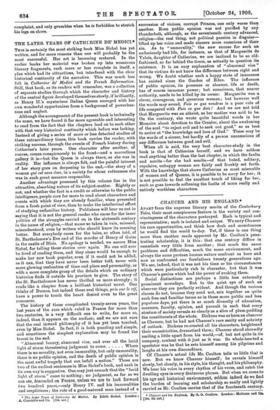THE DIARY OF A GEORGIAN SAILOR.*
COLONEL CHILDERS has done good service in editing and printing William Richardson's diary from the manuscript in the possession of his descendants. It is worth a dozen of the ordinary memoirs and compilations with which the market is flooded. For it is a genuine "human document," a revelation of the thoughts and doings of a typical English sailorman during the most stirring years in our naval history. The son of a sailor, he began life as a cabin-boy, and till he was super- annuated from the Navy he was rarely on land. He scarcely saw his family after the age of fifteen, except when now and again he ran across a ship in which a brother was serving. On the whole, he had a most uncomfortable life of it, and yet he is wonderfully content. Mr. Richardson is in his way a great philosopher, and his quaint sententiousness is one of the charms of the book. He loves to draw a moral and frame a generalisation. Like a true Briton, he is eager for "his rights," but he can also make large allowance for hard fortune. He loves dash and bravado in a leader, but likes a smack of piety along with it. When he visits Plymouth he goes to see the monuments in a church, and is delighted with the pathos of the inscriptions, reflecting how much better it was to spend his time there than to drink in a public-house. Yet he is by no means a prig, but very fond of fun and fighting and good cheer when he can get them. He is a lover of new sights and curious about great men, and is immensely pleased when he sees Mr. Pitt riding in the Park, or passes close to the Bellerophon' with Napoleon on board. Altogether, he is an excellent fellow to go voyaging with, and we defy the reader who follows Mr. Richardson in his diary not to end with a warm liking for him. He is so patient, so essentially reasonable, so abominably treated by fortune, and withal so indomitably cheerful.
He took to the sea at the age of twelve, making his first voyage with his father to London, and getting chased on the road by a privateer. The war with France was beginning, and we understand from his narrative something of the difficulties which merchant shipping had to face. A ship had to wait for weeks for a convoy or to go to remote parts of Britain to find one, and the return journey was even more protracted. Odd things happened on these voyages of his. Once they were only saved from striking by having a dog which could smell land ; once he and the other boys in the captain's absence broached a cask of Blackstrap, and were found, says Mr. Richardson frankly, "lying on our backs drunk and vomiting." He went to Algiers, where he was much scared by the lions, and to America, where he was put in gaol. There he had "not so much as a bench or bit of straw to lie on, nor a stone for a pillow; so much for Yankee freedom." Then he joined a slaver and went to Guinea, and, save in the memoirs of Cowper's friend Newton, we do not know where to look for a more graphic picture of the slave trade. He did not like the heat or the food, or going from "a land of Christians to a land of heathens, and from a cargo of black coals to a cargo of black human beings." In order to make the water last the crew were compelled to drink by sucking it up through a musket-barrel. The slaves were not raided, but bought from a villainous native chief, and do not seem to have been badly treated on board, save in the matter of the water allowance. Richardson was not so scandalised as one might have expected by the whole business, though the home-sickness of the slaves touched him, and he thought highly of the females. "Few could conduct themselves better in this situation, which made me think that all mankind were alike in human nature, and only education or custom made the difference." He was presently to taste himself a kind of slavery, for when he arrived in the Thames, eager to see his friends again, he was promptly seized by a pressgang. He was soon paid off, and his entry into the Navy was deferred for a little, but he never loses his dislike of the system. It is almost the only thing he is violent about. He thinks it as bad as negro slavery; but in his usual reasonable way he does not deny its necessity, but only asks for some equity in the methods. "Let sailors arriving from long voyages have liberty a month or more to spend their money and enjoy them- selves with their friends; then I will be bound to say they will
• A Mariner of England: an Account of the Career of William Richardson
0.0-1819), as Told by Himself. Edited by Colonel Spencer Childers, C.B., London: John ldneray. 1.103. 6d. net.] endure pressing with more patience, be better satisfied, and not so ready to desert."
Richardson's next experience was on an Indiaman, where he suffered from a ferocious captain. He made several coasting voyages in the Bay of Bengal, and was hard put to it for food. The crew got nothing but rice, ghee, and water, and were driven to catch and roast the rats with which the ship was infested, and to pick up rusty pork which was thrown overboard by an English transport. He was shipwrecked and lost all his belongings, and it was really a stroke of fortune that the pressgang got hold of him a second time. His first ship was the frigate 'Minerva,' under Admiral Cornwallis, "a religions and good man who could not beat the sight of a female." He came back to England with his gums swelled over his teeth with scurvy, lamenting the day when he had ever left his native land. He was drafted into the 'Prompte' and appointed a gunner, in which capacity he went with Sir Ralph Abercromby's expedition to the West Indies. When he got home again he married, and, being shortly after trans- ferred to the Tromp,' took his wife with him on the voyage to Martinique. For two wretched years his ship lay by that island, acting in the main as a prison-ship for the rebels. A certain Admiral Duckworth was in command, whom Richard- son calla "Old Tommy" and detests. He seems to have been a tyrant and a remarkable liar, but the great grievance against him was that he gave the sailormen no liberty. "Ab, Tommy, Tommy," says the author, "if you are not paid off for it in this world, you may be in the next!" Richardson suffered much, for he was ill fed, and he was constantly being cheated out of prize-money; but the thing which really galls him is being forbidden to land. His test of a good officer is the liberty he permits to his men. Martinique was one long nightmare owing to fever, and "of those who left England in the ship, only my wife and I, with two others, returned in her." When he got back his health was so low that the skin and sinews of his hands were like those of an old man. He petitioned the Admiralty for compensation, and got it, much to his surprise. Unlike most sailors, he thinks well of the Admiralty, which seems at that time to have been a fairly efficient Department.
After Martinique he had a spell of active service. He became a gunner in the Caesar,' Sir Richard Strachan's ship, and gives a most interesting account of that commander's victory in the Bay over the French ships escaping from Trafalgar. Sir Richard—called "Mad Dick" by his admiring crews—was a commander after Richardson's heart. He liked his piety and his earnest love of fighting. When Sir Richard had a convoy which would not keep close to him, he began by firing a gun as a signal, and ending by firing at them. Two years later the 'Caesar' sailed with Lord Gambier for the Basque Roads, and Richardson was present during that curious fight. As a gunner, he had much to do with the fire. ships, and gives an exact account of their use. He got nothing out of the business, which seems hard, since the com- bustibles ruined his clothes. A bright spot in his life was the sermons which the Rev. Mr. Jones preached after the victory, "touching on several remarkable instances of divine favour which happened on several occasions on our behalf." Richard- son was half Scottish in blood, and had a most Caledonian love of sermons. The rest of the book is taken up with the unfortunate Walcheren Expedition, where water for the use of the troops and crews was brought from England. Richard- son thought this fantastic, and declares the water on the island as good as any he tasted,—" I had many a good swig of it." After that he went to Lisbon, where his honest Protestant soul was revolted by the practices of "priests, monks and friars." He gives us the story of Wellington's victories as they dribbled down in garbled reports to the sailors at the coast.
In 1819, after some years' service on a store-ship, he was superannuated, and settled down at the age of fifty-ono to an old age of peace. He had 265 a year for pension, and lived comfortably at Portsmouth till his death at the age of ninety- seven. Like another pensioner, he might have written : "My name is Retired Leisure; I am to be met in trim gardens."
He built a small boat, and sailed her about the coast, disregard- ing the warnings of his friends, who predicted that she would prove his coffin. We have found the book delightful reading, for it is the frank autobiography of a very cheerful, patient, and worthy sailorman, who faces extreme hardships without a
complaint, and only grumbles when he is forbidden to stretch his legs on shore.















































 Previous page
Previous page